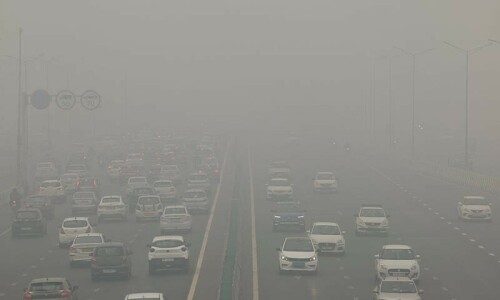LAHORE: With the scorching sun and severe heatwave persisting on Thursday, the people continued to bear the terrible impact of the worst power loadshedding in Lahore and adjoining districts in years.
Even the light rain in some areas of the city could not bring about any relief in hot weather conditions.
The citizens criticised the government for doing nothing to mitigate the effects of harsh weather by providing uninterrupted power supply, saying that it was making tall claims only.
“The terrible loadshedding has now become almost a routine in hot weather while the Lesco and government officials continue making tall claims of uninterrupted electricity supply to the people. Such claims are absolutely wrong,” deplores a resident of the Ravi Road.
“For the last many days, we have been facing unannounced loadshedding for two to four hours in different timings,” he added.
Similar comments were shared by the residents of the Bund Road, Johar Town, Kot Lakhpat, Kot Kamboh, Batapur, Baghbanpura, Kotli Pir Abdul Rehman, GT Road, Shahdara, Manga, Multan Road Township and some others.
“We have been witnessing loadshedding almost four to six hours daily and the Lesco officials don’t respond to our phone calls,” a Batapur resident said, asking where to go to register a complaint since no one seems to receive calls.
On the other hand, the Lahore Electric Supply Company (Lesco) admitted that its 132kV system is overloaded due to the 220/500kV system of the National Transmission & Despatch Company (NTDC) in peak hours.
“The NTDC’s 220kV Ravi and 500kV Sheikhupura grid stations and transmission lines are becoming overloaded in peak hours. Due to overloading of these grids, our two 132kV grids are also become overloaded,” said a spokesperson for Lesco in a press release.
He said the company was trying to observe loadshedding for the minimum time since outages are being carried out just to protect the system.
“If we avoid observing load management, the overloading system may lead to a power breakdown,” he explained.
Meanwhile, the loadshedding for two to four and four to six hours continues to be observed in the areas falling within jurisdiction of high-loss feeders. However, those paying bills regularly in these areas have criticised the government for punishing them along with the defaulters or those involved in the power theft.
“It seems that it is sin (for the consumers paying bills regularly) to live in the areas falling within service jurisdiction of high-loss feeders. The government must review this policy and separate us from those involved in power theft,” said a consumer.
Published in Dawn, July 9th, 2021














































